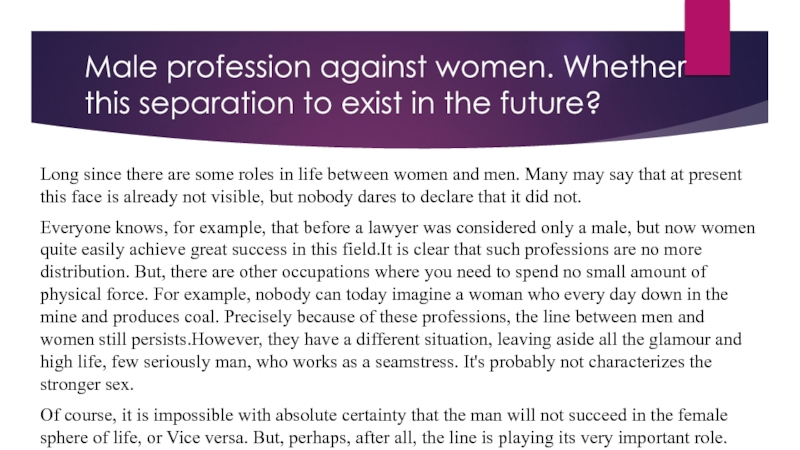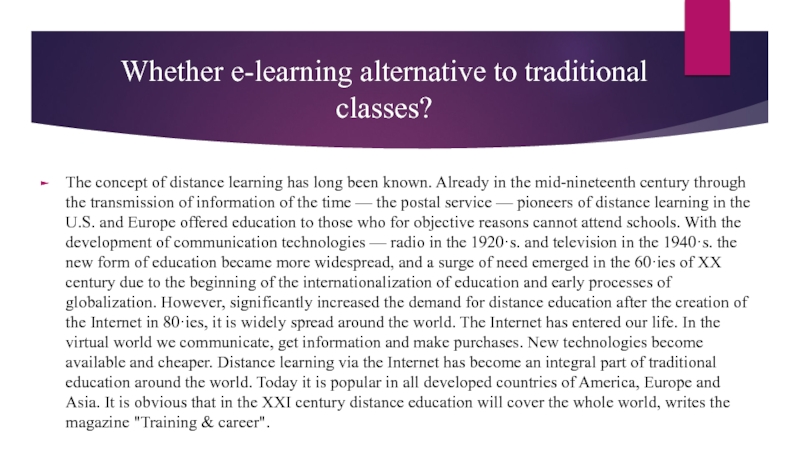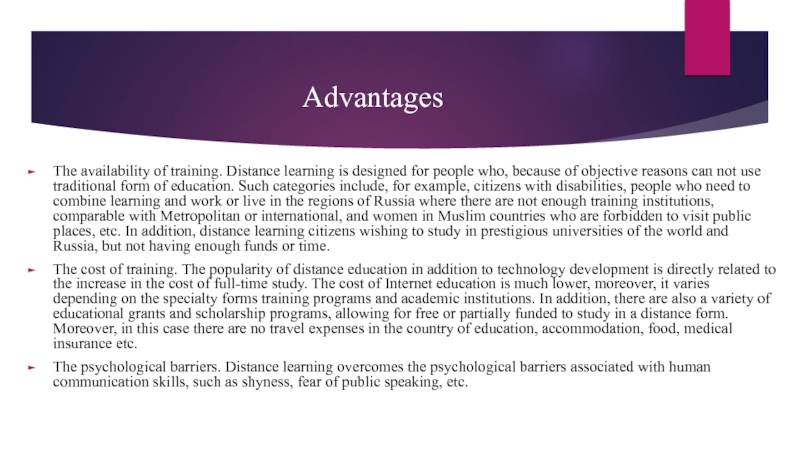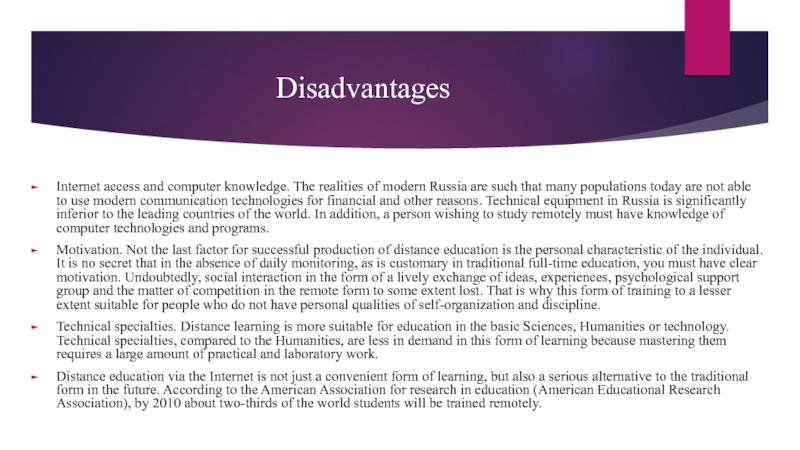Слайд 1Education
in the 21-st century
Подготовили: Дикова Екатерина, ученица 11 класса,
Литвинова
Светлана Леонидовна, учитель высшей
квалификационной категории МБОУ СОШ № 9
г. Новочеркасск
2016 – 2017 учебный год
Слайд 2Male profession against women. Whether this separation to exist in
the future?
Long since there are some roles in life between
women and men. Many may say that at present this face is already not visible, but nobody dares to declare that it did not.
Everyone knows, for example, that before a lawyer was considered only a male, but now women quite easily achieve great success in this field.It is clear that such professions are no more distribution. But, there are other occupations where you need to spend no small amount of physical force. For example, nobody can today imagine a woman who every day down in the mine and produces coal. Precisely because of these professions, the line between men and women still persists.However, they have a different situation, leaving aside all the glamour and high life, few seriously man, who works as a seamstress. It's probably not characterizes the stronger sex.
Of course, it is impossible with absolute certainty that the man will not succeed in the female sphere of life, or Vice versa. But, perhaps, after all, the line is playing its very important role.

Слайд 4What factors should be considered when choosing a career?
Each person
is unique – when selecting a suitable profession he is
guided by his personal factors, the environment, the advice of friends, interests friends. Of course, in practice, optimally to take into account their personal abilities and life interests but, unfortunately, they are often priced in the least. We will discuss the main factors that shape human preferences in the choice of their profession.
Слайд 5The opinion of parents, older family members
The position of his
friends – the impact of the environment
Opinions of school teachers,
teacher
Own professional plans
The tendency of man
Слайд 6Vocational College or University: which choice is better?
It all depends
on the future goals of the student, if the employment
– of course, the College, if theoretical knowledge – the University.
Today, employers need specialists with practical skills taught at College and universities bachelor's courses focus only on theory.
It is important to note that colleges shall promote the employment of their graduates: advising how to correctly create a resume, interview properly, to issue a work permit. Annually, a job fair and meet potential employers.
Of course, if your employer or your career is not enough your diploma, you will have the opportunity to continue their education at the University, intramural or extramural Department, while not disturbing daily work.
Слайд 7Thus, summarizing all above, we draw the following conclusions about
the benefits of College:
Colleges offer more diverse
number of programs, both in duration and content.
For graduates of Russian schools College more convenient for successful learning and integration into the new community;
The cost of training for a year in College two times lower the cost of education at the University.
The College gives a more practically focused training, and the University is theoretical.
Colleges retrain University graduates, helping them to obtain applied skills needed in the work.
Programs more intense and does not tolerate gaps.
Program colleges are always actual and modern.
Слайд 9At the end you will become a highly qualified specialist
who has the necessary knowledge in a certain area. You
will clearly know how and what you need to do. You will have an idea about all the intricacies of their profession.
This will give you an advantage when applying for work. Because every employer is interested in the fact that he employed competent and smart professionals. And the skills of a person with higher education go far beyond the skills of someone who has only secondary.
With higher education you will be able to obtain the profession of your dreams. After all, colleges and technical schools train specialists for all professions. But for all universities, and in the course of the training, you will be able to choose a narrower profile in the studied field of knowledge.
The advantages of higher education
Слайд 10Over the years spent at the Institute, you will receive
invaluable experience. In fact, besides the theory, you'll still have
to practice. And the practice, as you know, works better than theory.
You will meet many new interesting people, each of which can open you something new, show off your look at familiar things, and maybe over the years you will meet and love.
Time spent at the University the most fun and carefree. You're still not an adult but not a child. You are allowed pranks, but then will start adult life, you will bear the burden of responsibility, and after graduation you will already be a fully independent person. So do what you could not tell or remember without laughter.
Слайд 12The plan of a new educational system
New features of the
standard are:
formation of the Russian (civil) identity;
humanization of education and
school activities;
provision of state guarantees in respect of the conditions under which it is possible to achieve the planned results of education;
ensuring the compatibility, comparability of Russian and advanced foreign educational systems.
Слайд 13The innovative nature of the new standard is expressed by
the following conceptual points:
key objectives of education through the system
of values education;
focus on the development of variability of education;
systemic-activity approach as a General pedagogical basis for the definition of requirements to results of education (the goal of education is the development of the individual student based on the development of universal ways of activity);
definition of the scientific content of education based on the allocation of its fundamental core;
the restoration of the role of education in the education system as a major component of personal results of development of standards;
a new system of organization of educational process through the development of the new structure of the basic educational plan, implementation of health technologies, the formation of an open information-educational environment, etc.
Слайд 15Whether e-learning alternative to traditional classes?
The concept of distance learning
has long been known. Already in the mid-nineteenth century through
the transmission of information of the time — the postal service — pioneers of distance learning in the U.S. and Europe offered education to those who for objective reasons cannot attend schools. With the development of communication technologies — radio in the 1920·s. and television in the 1940·s. the new form of education became more widespread, and a surge of need emerged in the 60·ies of XX century due to the beginning of the internationalization of education and early processes of globalization. However, significantly increased the demand for distance education after the creation of the Internet in 80·ies, it is widely spread around the world. The Internet has entered our life. In the virtual world we communicate, get information and make purchases. New technologies become available and cheaper. Distance learning via the Internet has become an integral part of traditional education around the world. Today it is popular in all developed countries of America, Europe and Asia. It is obvious that in the XXI century distance education will cover the whole world, writes the magazine "Training & career".

Слайд 16
The availability of training. Distance learning is designed for people
who, because of objective reasons can not use traditional form
of education. Such categories include, for example, citizens with disabilities, people who need to combine learning and work or live in the regions of Russia where there are not enough training institutions, comparable with Metropolitan or international, and women in Muslim countries who are forbidden to visit public places, etc. In addition, distance learning citizens wishing to study in prestigious universities of the world and Russia, but not having enough funds or time.
The cost of training. The popularity of distance education in addition to technology development is directly related to the increase in the cost of full-time study. The cost of Internet education is much lower, moreover, it varies depending on the specialty forms training programs and academic institutions. In addition, there are also a variety of educational grants and scholarship programs, allowing for free or partially funded to study in a distance form. Moreover, in this case there are no travel expenses in the country of education, accommodation, food, medical insurance etc.
The psychological barriers. Distance learning overcomes the psychological barriers associated with human communication skills, such as shyness, fear of public speaking, etc.
Advantages

Слайд 17Disadvantages
Internet access and computer knowledge. The realities of modern Russia
are such that many populations today are not able to
use modern communication technologies for financial and other reasons. Technical equipment in Russia is significantly inferior to the leading countries of the world. In addition, a person wishing to study remotely must have knowledge of computer technologies and programs.
Motivation. Not the last factor for successful production of distance education is the personal characteristic of the individual. It is no secret that in the absence of daily monitoring, as is customary in traditional full-time education, you must have clear motivation. Undoubtedly, social interaction in the form of a lively exchange of ideas, experiences, psychological support group and the matter of competition in the remote form to some extent lost. That is why this form of training to a lesser extent suitable for people who do not have personal qualities of self-organization and discipline.
Technical specialties. Distance learning is more suitable for education in the basic Sciences, Humanities or technology. Technical specialties, compared to the Humanities, are less in demand in this form of learning because mastering them requires a large amount of practical and laboratory work.
Distance education via the Internet is not just a convenient form of learning, but also a serious alternative to the traditional form in the future. According to the American Association for research in education (American Educational Research Association), by 2010 about two-thirds of the world students will be trained remotely.
